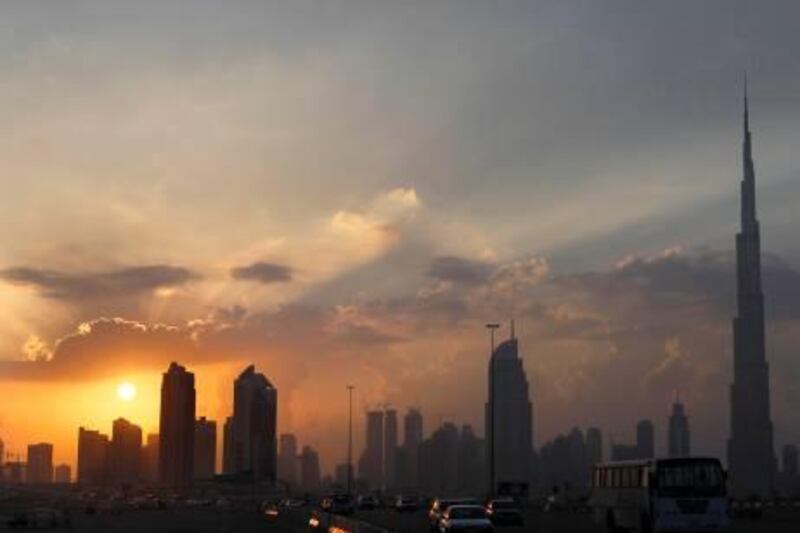Dubai took an unprecedented step towards openness yesterday with its first quarterly update on the local economy and restructurings at some of its biggest business groups. In attendance were Sheikh Ahmed bin Saeed Al Maktoum, the chairman of Emirates Airline and president of the Dubai Department of Civil Aviation; Ahmed Humaid al Tayer, the governor of the Dubai International Financial Centre; Mohammed al Shaibani, the director general of the Dubai Ruler's Court; and other top government officials. Sheikh Mohammed bin Rashid, the Vice President of the UAE and Ruler of Dubai, also attended.
Officials plan to repeat the exercise every three months, increasing transparency after complaints from analysts and other observers that the Government was not sufficiently forthcoming about debt restructurings and the state of the local economy. "We continue to work towards improving the level of disclosure and transparency," Sheikh Ahmed said. "We are holding open dialogue forums like this one."
What they say:
Sheikh Ahmed bin Saeed Al Maktoum, the chairman of the Dubai Supreme Fiscal Committee, the Supreme Committee for the Supervision of Dubai World and of Emirates Airline:
The next step in Dubai's growth will involve a return to the kinds of businesses that the emirate has long thrived on: its lucrative ports, transportation and tourism sectors, Sheikh Ahmed said yesterday.
"We know that our next phase of development will require a differentiated strategy and a new way of thinking, and we are prepared for that," he said.
Ultimately, he said, the financial crisis was an opportunity for Dubai. The ordeal forced leaders of the emirate to think hard about long-term strategies and also boosted its competitiveness by making property and rents cheaper.
"The slowdown that took place over the last two years gave us in Dubai the opportunity to rethink, regroup and return to basics in order to leverage on our core, tried and tested competitive edge," he said. "As the world around us has changed, we too must adapt."
Ahmed Humaid al Tayer, governor of the Dubai International Financial Centre, and chairman of Emirates NBD and Commercial Bank of Dubai:
"Chaos is part of life, but tranquility is a sign of death."
That is how Mr al Tayer opened his remarks at Dubai's first economic update, referring to the upheaval caused by the emirate's recent struggles with debt.
Dubai's economy was growing, and despite the US$24.9 billion (Dh91.45bn) debt restructuring the government-owned group Dubai World completed this year and further restructuring at Dubai Holding, a conglomerate owned by Sheikh Mohammed bin Rashid, Vice President of the UAE and Ruler of Dubai, concerns about the emirate's ability to handle its debt were overblown, Mr al Tayer said.
"There is nothing to worry about as far as our ability to fulfil our obligations," he said.
He also pointed to recent news that work has restarted on several projects by Nakheel, a developer owned by Dubai World, as evidence that things were picking up.
Mohammed al Shaibani, the director general of the Dubai Ruler's Court and chief executive of the Investment Corporation of Dubai:
Dubai was considering privatising some of its assets to help meet its forthcoming debt repayments, said Mr al Shaibani.
"There might be a privatisation plan, which is something we're working on with the Government," he said. "Dubai is rich in assets and … this might be used as a mechanism to reduce some of our debts in the future."
Mr al Shaibani also said Dubai's sovereign debt burden stood at $30bn.
The figure did not include other debts considered operational such as that owed by Emirates Airline, which was expanding and continued to finance its aircraft, he said.
External estimates on the emirate's debt load were inaccurate, Mr al Shaibani said. The Institute of International Finance has estimated the emirate's total debt obligations to be $112.3bn.
He also said the Government was keen to encourage its government-related companies to tap international debt markets as a source of financing.
Faisal Mikou, the executive vice president of the Investment Corporation of Dubai:
Dubai World's $24.9bn debt restructuring will offer the company time to improve the value of its assets ahead of possible future sales, Mr Mikou said.
"The restructuring provided a significant runway for Dubai World to work on the value of its assets and improve their value before making any disposal if needed," he said.
Mr Mikou also provided an update on the financial performance of other companies that were part of the Dubai World portfolio.
Nakheel's financial and operational restructuring was moving according to plan, he said. The developer, a subsidiary of Dubai World, has paid nearly $1bn of cash to trade creditors since July, Mr Mikou said. It aimed to issue a sukuk to creditors in the first quarter of next year, he said.
Economic Zones World, a provider of logistics and industrial infrastructure, was focused on refinancing its debt obligations in 2012, he said.





